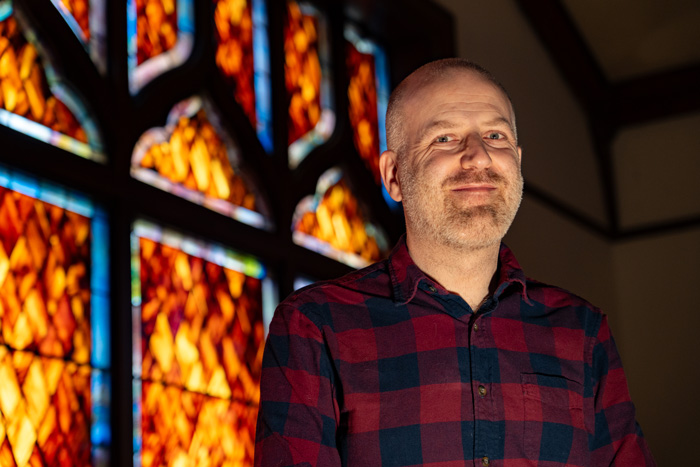Work on the Death Star and Find Out

Toby Reiner in Denny Hall, home to the Department of Political Science. Photo by Dan Loh.
Office Hours: Associate Professor of Political Science Toby Reiner
by Tony Moore
Associate Professor of Political Science Toby Reiner received his Ph.D. in political science from the University of California–Berkeley. His interests lie in the ethical aspects of world politics, public policy and political ideologies. He recently published the article “What Are the Principles of Civilian Immunity in War?” in The Conversation.
The U.S. is awash in politics and politicians but seemingly less so in political thought. But of course it feels like a deep understanding of one’s own—and other people’s—political stances should form the backbone of those very stances. Why is Dickinson the place to go for students who want to grasp it all more thoroughly?
We have coverage of a very wide range of fields and areas in political science that many other liberal-arts colleges can’t match. For one thing, we have many more faculty members, and that means that students have a lot of interesting course options. We also have a flexible major, so while students get a grounding in all the main fields of politics, they can also specialize in areas that most interest them. Many of our students love to get a deep dive into American politics, while others prefer to focus on different areas of the world. My own students focus mostly on political ideas at a more abstract level, including justice, equality, freedom, democracy and rights.
Your recent Conversation piece was a truly fascinating look at the ethics of war, particularly focusing on just-war theory and civilian immunity to the ravages of war. I happen to know you’re a Star Wars fan and that your history with the franchise is complicated. Let’s complicate it a little more: What would moral philosophers say about the rebels blowing up the Death Star (twice), when clearly thousands of people who were killed were not part of the empire’s war machine and were just there hustling for a paycheck?
The traditional answer given by philosophers of war is that those working in military construction are not immune from attack, even though they are not technically combatants. We wouldn’t accept an assassin saying they were working for a paycheck as a justification, so it’s the same for working on a weapon of mass destruction such as the Death Star. But that answer isn’t fully satisfying, because we don’t know how much choice the contractors had in the matter. Perhaps they were drafted—though according to military ethics, conscript soldiers fighting an aggressive war, such as the empire’s, are legitimate targets, because they are engaged in acts of harm. This question shows that we need to link questions of the justice of war to broader issues of social justice in ways that we don’t often do.
Generally, political science accounts for more Dickinson majors than any other discipline but one (nice work, international business & management). What is it about poli sci that draws students to the major as an academic focus and for their career aspirations?
This is an interesting question because I think my interests in politics are unusual. From what I can tell, many students are attracted to the major because they think it’s good training for law school—poli sci is the most popular major nationwide for prospective law students—or for working in government jobs in and around D.C. Some enjoy it because they find the study of power fascinating. Many others just want to learn more about the world, whether that’s close to home and they’re fascinated or alarmed by the direction of American politics, or a place they’ve traveled to or are interested in. There’s also no doubt that I have a lot of charismatic colleagues with whom students take a class and want more!
TAKE THE NEXT STEPS
Published February 7, 2024